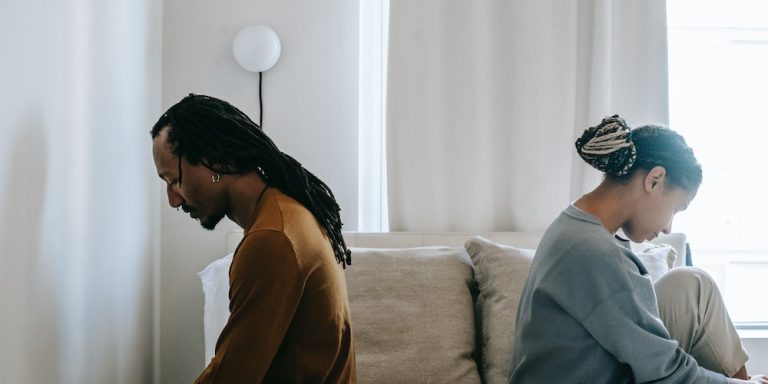In this article, we’ll talk about the power of vulnerability and how it can contribute to a strong relationship. If this interests you, then keep reading.

Introduction
In every relationship, be it romantic, platonic, or professional, vulnerability plays a crucial role in building and sustaining a strong connection between individuals.
The willingness to be open, honest, and exposed emotionally can lead to deeper intimacy, trust, and understanding.
In this article, we will explore the power of vulnerability in fostering healthy relationships and how embracing it can lead to a more profound and fulfilling bond between people.
The Power of Vulnerability

This section elaborates on what vulnerability is, and how we can use it to build trust and emotional intimacy.
What is Vulnerability?
Vulnerability refers to the state of being open and exposed, allowing oneself to be emotionally available and transparent with another person.
It involves sharing fears, insecurities, weaknesses, and emotions without the fear of judgment or rejection.
Vulnerability is not a sign of weakness but rather an act of courage and strength, as it requires genuine self-acceptance and trust in the other person.
Building Trust through Vulnerability
When we show vulnerability to someone else, it communicates a level of trust and authenticity.
By sharing our innermost thoughts and feelings, we invite the other person to do the same, creating a reciprocal dynamic of openness and trust.
This trust forms the foundation of a strong and lasting relationship.
Enhancing Emotional Intimacy
Vulnerability is the key to unlocking emotional intimacy in any relationship.
When individuals are willing to be vulnerable with each other, they allow themselves to be truly known and understood.
This level of emotional intimacy fosters a deep connection, empathy, and compassion between partners, friends, or colleagues.
Overcoming Fear and Misconceptions
The Fear of Rejection
One of the main reasons people shy away from vulnerability is the fear of rejection.
They worry that by revealing their true selves, they may face judgment, ridicule, or abandonment.
However, by embracing vulnerability, we create an opportunity for acceptance and validation, leading to stronger and more meaningful connections.
Vulnerability is a Strength
Society often portrays vulnerability as a weakness, associating it with being defenseless or fragile.
In reality, embracing vulnerability is an act of strength, as it requires courage to face our fears and insecurities head-on.
When we share our vulnerabilities with others, we show that we are human, relatable, and capable of growth.
The Importance of Boundaries
While vulnerability is essential for building relationships, it is crucial to set healthy boundaries.
Being vulnerable doesn’t mean sharing every detail of our lives with everyone we meet.
It means choosing to open up with those we trust and feel safe with.
Boundaries protect us from potential harm and ensure that vulnerability is shared within safe and supportive spaces.
Vulnerability and Communication
Fostering Effective Communication
Vulnerability is a catalyst for open and honest communication.
When individuals are willing to be vulnerable, they are more likely to express their thoughts, feelings, and needs authentically.
This transparency in communication reduces misunderstandings and conflicts, leading to more productive and harmonious relationships.
Conflict Resolution and Empathy
In moments of conflict, vulnerability can be a bridge to resolution.
By expressing our emotions and perspectives openly, we allow the other person to understand our point of view better.
Likewise, being receptive to the vulnerability of others enables us to empathize and find common ground, fostering reconciliation and growth.
Embracing Vulnerability in Different Relationships
Romantic Relationships
In romantic relationships, vulnerability is a cornerstone of emotional connection.
By sharing vulnerabilities with our partners, we deepen our emotional bond and build a sense of safety and security.
Couples who embrace vulnerability are more likely to experience lasting love and a stronger partnership.
Friendships
In friendships, vulnerability fosters intimacy and support.
When friends can share their struggles, dreams, and fears, they create a supportive network that helps each other navigate life’s challenges.
Vulnerability strengthens the bonds of friendship and creates an environment of trust and loyalty.
Professional Relationships
In professional settings, vulnerability can lead to stronger teamwork and collaboration.
When colleagues are open about their strengths and weaknesses, they can complement each other’s skills and work more effectively as a team.
Vulnerability also encourages a positive work culture that values authenticity and mutual support.
Conclusion
Vulnerability is a powerful force that contributes to the foundation of strong and meaningful relationships. By embracing vulnerability, individuals foster trust, emotional intimacy, and effective communication. It is not a sign of weakness, but rather an act of courage and authenticity that can lead to deeper connections with others. So, let us embrace vulnerability and experience the transformative power it brings to our relationships.
Frequently Asked Questions
Q: Is vulnerability always reciprocated in a relationship?
A: While vulnerability can encourage reciprocation, it is not guaranteed. Some individuals may struggle with embracing vulnerability due to personal reasons. The key is to communicate openly and create a safe space for both parties to share their feelings.
Q: Can vulnerability make a relationship stronger even during difficult times?
A: Yes, vulnerability can strengthen a relationship during challenging times. By being open about emotions and fears, partners can provide support and understanding, fostering resilience and trust.
Q: Are there any risks to being vulnerable in a relationship?
A: Vulnerability can come with risks, such as potential rejection or misuse of personal information. However, setting healthy boundaries and choosing trustworthy individuals to share vulnerability with can mitigate these risks.
Q: Can vulnerability lead to personal growth?
A: Yes, vulnerability often leads to personal growth. By confronting fears and insecurities, individuals can develop resilience, self-awareness, and a deeper understanding of themselves.
Q: How can I encourage my partner to be more vulnerable?
A: Creating a safe and non-judgmental environment is crucial. Express your own vulnerabilities first, actively listen, and avoid criticizing or dismissing their feelings. Encourage open communication and reassure them of your support.



